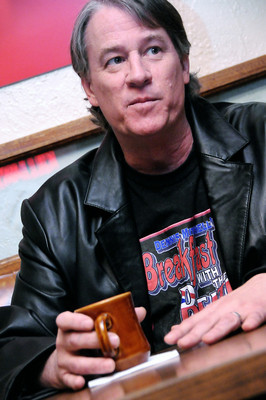NOTHING NEW
2009 is 11 days old, and that mist you see hanging over the valley is the dust of thousands of ambitious, and now disintegrated, New Year's resolutions.
One of them was the former property of Las Vegas novelist Vicki Pettersson.
"I try to be a resolution person, but not remotely successfully," says Pettersson, author of "The Touch of Twilight" and other urban fantasies. "I know I'm setting myself up for failure, but I can't seem to keep from doing it every year."
Foremost among Pettersson's list of annually doomed resolutions: to write every day.
"It's like exercise. You've got to build up that writing muscle," Pettersson explains. "And who can't do 10 minutes a day? You can't call yourself a professional writer and not hit 10 minutes a day."
Yet, Pettersson never quite is able to pull it off. So, she has hit upon a novel way to deal with New Year's resolutions: She deliberately breaks them on the first day of the year. Then, with the pressure to keep it for another 364 days gone, Pettersson heaves "a big sigh of relief" and gets on with her life.
"It's like really bad reverse psychology," Pettersson jokes. But, "for 24 hours, I'm golden."
Why are so many of us so bad about keeping our New Year's resolutions? The answer begins with why we bother to make them in the first place.
"I think why we make them is there's always the urge to improve ourselves, and we use this time of year as some sort of motivator," says Donna Wilburn, a Las Vegas licensed marriage and family therapist.
But, in our zeal to improve ourselves, we usually bite off more than we can chew. Or, Wilburn notes, the resolutions we make are too vague or, even, voiced in a way that dooms them to failure.
Setting goals -- and that's pretty much all resolution-making is -- is "a really specific process," Wilburn says, "and not a lot of people know how to do that."
Many of us make resolutions that are "outcome-based, versus performance-based," Wilburn says.
For instance, "I'm going to lose 20 pounds" is outcome-based, Wilburn says. "The outcome is (losing) 20 pounds, and if you don't lose 20 pounds, you've failed. And if we don't achieve our goals, we tend to get real depressed and disappointed."
Wilburn suggests recasting resolutions to focus on performance. Instead of trying to lose a certain number of pounds this year, say "I'm going to try to exercise at least twice a week." That way, the success of the resolution is based on performance, rather than on the ultimate outcome alone.
Focusing on the process rather than the result is working -- so far, anyway -- for Dennis Mitchell, whose No. 1 unfulfilled New Year's resolution in the past has been to get into better shape.
"I rarely kept it," admits Mitchell, a veteran Las Vegas radio DJ and host of the syndicated "Breakfast with the Beatles," which airs at 10 a.m. Saturday and 5 p.m. Sunday on KMZQ-AM, 670.
But Mitchell this year stumbled onto a solution.
"I play handball, and it just dawned on me recently that, for whatever reason, if you pick something you like to do, you'll do it," he says. "The treadmill and the stair-stepper and this stuff, even long walks, get the job done, but do you look forward to that?"
In contrast, Mitchell continues, "I love playing handball, so I play two or three times a week, maybe, more than I used to."
And, he adds, "so far so good."
Chef/author Rick Moonen of RM Seafood at Mandalay Bay each year makes what he calls "my diet and exercise resolution," resolving to eat better and to cleanse himself physically after the Thanksgiving-through-New Year's Day culinary eatathon.Yet, Moonen says his resolution usually has crumbled not long after the new year has arrived.
Things start fine with his resolution to dine on healthy proteins and vegetables. "Heck," he jokes, "I'm Rick Moonen. I've got a seafood restaurant. I can roll out beautiful fish every day.
"But even that starts to break down after a while. Then your protein becomes ham, and then it becomes a hot dog, and all of a sudden, your 'protein' is salami."
Still, Moonen doesn't give up. He still pursues his dietary and exercise goals, but "I don't call them 'resolutions' so much, because you feel bad breaking them."
Some resolutions are easier to keep than others. It helps, for instance, if a resolution is built upon a strong, even emotional, personal goal. Pettersson, for instance, always makes an annual resolution to work out more days than not.
"I do work out, and I always want to work out, but I still feel resistant toward that," she says.
But, jokes Pettersson, who performed in "Les Folies Bergere" before turning full-time professional author, that one's easier to keep "because I don't want to have a fat ass. That one takes a bit longer to break. I can't seem to give up entirely on that. I have that showgirl background."
College of Southern Nevada history professor and historian Michael Green even finds a measure of comfort in knowing his limitations.
"Every year I resolve to lose weight and eat less chocolate," he says, "and I never lose as much weight as I think I should, and I take great pleasure in breaking the other resolution."
Actually, therapist Wilburn isn't a fan of New Year's resolutions at all, mostly because of the sense of failure they tend to foster.
Besides, she adds, "I'm not a fan of waiting until the end of the year to set a goal. I don't believe in waiting. I believe if you're going to work on a goal, start now."
Contact reporter John Przybys at jprzybys@reviewjournal.com or 702-383-0280.


















